So, why is it important to learn how to do keyword research? While some bloggers drive traffic to their websites from a combination of social media, word-of-mouth and email subscribers—the most successful blogs diversify their marketing. That includes strategic keyword research with the best (free) keyword tool & thoughtful content planning that results in traffic from search engines.
If your overall traffic driving strategy includes attracting readers from search engines like Google, then the strength of your keyword research game will make or break your success as a blogger.
How to Do Keyword Research (and Get 584,958+ Blog Readers) in 2025
- What is Keyword Research? (Definition)
- Why is Keyword Research Important? (How Does it Work with SEO)
- Start with Establishing Your Seed Keywords
- Importance of Long-Tail and Medium-Tail Keywords
- High-Volume, Low Competition, High Click Rate Keywords
- How to Analyze Your Keyword Competitors
- Keyword Research by Season and Regions
- Understanding the Search Intent of Your Readers
- Which Keywords Does Your Blog Already Rank For?
- 8 Best Keyword Research Tools to Use (Free and Premium)
Disclosure: Please note that some of the links below are affiliate links and at no additional cost to you, I’ll earn a commission. Know that I only recommend products and services I’ve personally used and stand behind. When you use one of my affiliate links, the company compensates me, which helps me run this blog and keep all of my in-depth content free of charge for readers (like you).
Use My Free Keyword Research Tool

Try my free AI-Powered Keyword Tool to get dozens of research-backed ideas for keywords & topics to write about on your blog today.
I use my smart keyword research process to bring million of readers to my blog every year.
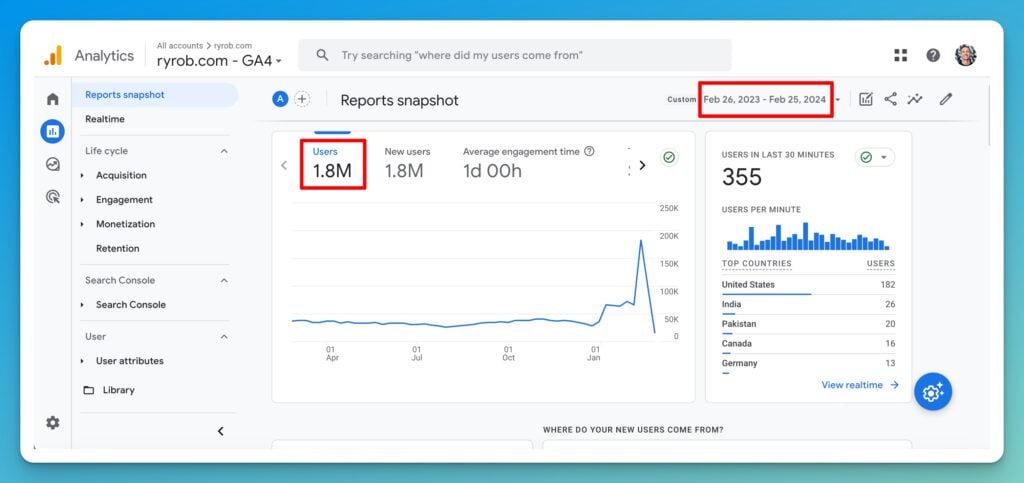
Because I’ve done thorough keyword research, I’ve chosen to write about blog topic ideas that (1) get a high volume of searches every month and (2) bring readers that have high intent & relevancy to the ways I make money blogging through affiliates and courses.
Now, let’s talk about how to do keyword research (the right way) this year. Keyword research has literally built my entire blogging business. Once you’re ready to put your keyword research into practice and build a profitable blog—head over to my ultimate guide to starting a blog.
And as a quick aside, if you’re having trouble with your content planning efforts, you can grab my free blog planner bundle and turn things up a notch today.
Use My 50+ Powerful Free Blogging Tools Today

When I first started blogging, I couldn’t afford fancy tools. That sucked. And that’s why I’ve built a stable of powerful free blogging tools ranging from keyword research to an AI article writer, blog idea generator and more. Forever free for all to use—no strings attached.
Here’s what you need to know about keyword research and how to drive more monthly readers from search engines. But first, let’s cover the basics.
1. What is Keyword Research? (Definition)
Keyword research is the process of identifying and analyzing the words and phrases people enter into search engines. It helps businesses, bloggers, and content creators understand what topics their audience is interested in, so they can optimize their content to rank higher on search results and attract more relevant visitors.
When using the right blogging tools to do your keyword research (like my very own free keyword tool, Ahrefs or Twinword Ideas), you’ll answer mission critical questions like:
- How many people are searching for this keyword phrase each month?
- What are the related keywords those people are also searching for?
- What needs to be covered (and solved) in a blog post on this keyword phrase?
- Who are the other websites competing to rank for this keyword phrase?
If you want to create valuable content for your blog (and readers) that actually helps users, then keyword research is an excellent place to start—so that you can ensure you’re writing blog posts that’ll deliver real value to people seeking those answers.
Using Keyword Research for PPC and Google Ads
Keyword research isn’t just for creating valuable blog content—it’s also a powerful tool for your paid search campaigns. By identifying high-performing keywords, you can build targeted Google Ads and PPC (pay-per-click) campaigns that drive qualified traffic to your site. With the right data, you can:
- Choose keywords that align with your audience’s intent,
- Optimize your bids and ad copy for better click-through rates, and
- Improve your return on investment by reaching prospects who are actively searching for your product or service.
Leveraging keyword insights in your PPC strategy ensures that your ads speak directly to your audience’s needs and helps you stand out.
2. Why is Keyword Research Important and How Does it Work With SEO?
If you’re not already familiar with the term SEO, it stands for search engine optimization. SEO is the set of best practices and strategies by which you can make your blog more friendly to search engines—and thus rank your content higher in Google search results. The higher you rank, the more likely searchers are to come to your website.
Here are a few blogging statistics related to SEO that further illustrate the importance of keyword research:
- Google is responsible for 91% of total organic traffic
- 75% of searchers never go past the first page of Google’s search results page
- Close to half of all clicks on the SERPs (search engine result pages) go to the top 3 listings
- 51% of all website traffic comes from organic search, 10% from paid search, and 5% for social
Keyword research is a necessary foundation for creating an SEO-friendly website.
Moreover, keyword research will not only show you know what’s trending in your industry, but also uncover what kinds of competition you’ll have for the keyword phrases you want to rank for. As an added bonus, check out my tutorial about how to set up Google Alerts and get a leg up on how your competitors are promoting their blog content.
Alright, so all of this sounds great… but how do you actually do keyword research?
How do you use keyword research to create top-ranking content for your blog? It all starts with a great keyword tool.
3. Start with Establishing Your Seed Keywords

In order to create a successful, keyword research-backed content plan for your blog you’re going to need to discover what people are actually searching for on the Internet. If you’ve already established your niche, the next step is to begin searching for seed keywords that can represent the broad purpose of your blog.
Seed keywords are baseline keywords that fit your business or niche. They’re the overarching ideas that’ll serve as your main content categories that you can later narrow down into more specific blog post ideas.
Take for example my blog right here. Today, I talk a TON about about starting, growing and monetizing a blog. Some of my seed keywords include terms like:
- Blogging
- Blog
- WordPress
- WordPress blog
- Personal blog
- Self-hosted blog
- WordPress themes
- Blog sites
- Web hosting plans
- Side hustle
- Side income
The list could go on a bit longer, but these are the main categories that all of my blog content falls under.
To narrow down your seed keywords that’ll represent the overall goal of your blog, think about your niche and the parts of it you’re most interested in.
List out five to ten keyword phrases that best capture those topics. Now those are your seed keywords. Don’t know where to begin? Try my free keyword cluster generator to help you brainstorm seed keyword ideas.
Use My Free Keyword Research Tool

Try my free AI-Powered Keyword Tool to get dozens of research-backed ideas for keywords & topics to write about on your blog today.
4. Importance of Long-Tail and Medium-Tail Keywords
When you do keyword research, you’re naturally going to be attracted to the terms that get a lot of search volume.

However, if you’re looking at only one or two-word keywords, you’re probably not going to rank #1 (anytime soon). The only caveat to this being if your blog already has an extremely high level of domain authority you can leverage to your advantage. Even still, you’ll be competing against massive sites for those keywords.
That’s exactly why your keyword research needs to go far beyond just high-search volume seed keywords.
Let’s say your blog is about woodworking. It’s not likely you’re going to rank #1 for a blog post focused only on the keyword “woodworking.” There’s way too much competition, and it’s really not specific enough.
In fact, 50% of search queries are four words or longer.
That means over half of search queries are for something more specific (long-tail) than just one, two or even three words. People are turning to the search engines like Google to answer increasingly complex questions.
These longer keyword phrases are called long-tail or medium-tail keywords.
Going back to our woodworking example, a long-tail or medium-tail keyword might focus on a specific product or technique within the woodworking sphere. You’ll undoubtedly find it easier to rank for longer-tail keyword phrases like:
- Easy bandsaw box plans
- Simple woodworking project ideas
- Top tools for hobby woodworking
Rather than trying to rank your blog content for keyword phrases like “wood” or “woodworker,” taking this approach of targeting these long-tail keywords will not only help your content rank faster—but it’ll also bring you more targeted, higher-intent readers.
A more narrow keyword phrase like the examples for woodworking above, means you’ll have a much greater chance of giving searchers the information they’re really looking for.
Of course, long-tail and medium-tail keywords don’t have as high search volume as you’ll get from a one or two-word keyword phrase. But, you’re far more likely to convert these long-tail visitors into email subscribers or paying customers—because you’re giving them exactly what they want.
That’s a big win if you hope to monetize your blog.
5. High & Medium Volume, Low Competition, High Click Rate Keywords
Generally speaking, you want to do keyword research in order to find the keyword phrases that have both:
- A high-volume search
- Low competition
Those are the goldmine keyword opportunities where you (1) have a real chance to rank high in organic search results and (2) stand to win big in terms of the amount of traffic you’ll drive.

On top of these two factors though, you also want to target keywords that have a high click-through rate.
If you’re able to find a keyword phrase that has a high search volume with a relatively small number of people writing about the topic—then you’ve found the sweet spot for a great opportunity in your niche.
Now what constitutes a high search volume is relative to what you’re writing about and how narrow your keyword phrase is.
There are single-word keywords that get literally millions of searches every single month. Obviously, that’s a very high-volume keyword—and is probably too broad to be worth much to your website anyway.
However, if you’re evaluating a long-tail keyword phrase… high volume may constitute as few as 1,000 to 10,000 searches per month.
The person searching for these phrases has a clear idea of what they’re searching for so there’s a better chance they’ll click on your site.
6. How to Analyze Your Keyword Competitors
Another crucial factor to consider when doing keyword research is your competition.

Look at the other blogs in your niche and draw insights about what makes them attractive in the eyes of their readers.
Use these ideas to improve your own approach to content and positioning your brand (or if you must, go back to the drawing board and make a new website with a better website builder or theme).
More importantly—you can use your competition to do keyword research and get a head start.
Analyze Google’s Top-Ten Research Results
The best way to learn what’s currently being favored by Google is to type in your target keyword phrase and analyze the top-ten search results. These will be your main competition for the keyword you’re trying to rank for.
This’ll also give you invaluable insights about which content format you should focus on.
For example, the top-ranking results might be blog posts, infographics, explainer videos or even product pages from businesses that are selling a product which focuses on the need at the core of this keyword phrase.
When the top-ranking posts are created by big businesses, it can be difficult to compete.
That doesn’t mean it’s impossible for your blog to rank for extremely competitive terms, but it does mean that it will take a lot of time and effort through strategic tactics like guest blogging, tweaking your blog SEO, and other blog growth initiatives over the course of months (and years) to come.
Keep this in mind as you do your keyword research and prioritize which ones to pursue.
In general, as you do more keyword research, you’ll develop a better idea of how hard it’ll seemingly be for your content to outrank the existing top search results—and always strive to uncover ways you can do a better job of answering the search-intent of a reader who lands on your post.
See How Much Competition There Is For Your Keywords
The next thing to analyze is how many people are already writing about your keywords.

If your keywords are very popular and easy to write about, there’s probably already a lot of content popping up on search engines. If that’s the case, then there are two ways to approach this scenario.
Approach #1: Look for Keyword Gaps
The first direction you can go here, is to do keyword research with the goal of identifying opportunities your competition has overlooked. These longer-tail keyword phrases will likely include:
- Information, knowledge, skills or processes that are not as commonly known
- Topics that represent information that’s new in a particular niche
At any rate, if there’s a keyword phrase that has a lot of interest and your competition isn’t writing about it yet, jump in and start ranking for that search term ASAP.
Approach #2: Commit for the Long Haul
The second option on the table, is to take those high-competition keywords and commit to working hard at doing everything you possibly can in order to outrank your competitors. Look at what the other competitive articles are offering… and offer 2x more to readers on your blog.
Google shows preference to websites that offer the absolute best value to their visitors—and that’s really what searchers are looking for.
Employ proven strategies that can boost your search rankings and make your blog more reputable. Start here:
- Guest blogging
- Perfecting your blog’s SEO
- Implementing these traffic driving strategies
- Using blogger outreach to establish partnerships and grow your audience
Ultimately the best SEO strategy is to be the blog that offers the best value on the keywords you’re covering.
Once you’ve done that, it’s time to shout about it from the rooftops (metaphorically speaking, that is).
Inspect Backlinks to See How Successful Your Competition Really Is
Another way to learn more about your competition is through the backlinks they’ve accumulated.
Backlinks are created when an external website links to your content.
Almost without exception, the more backlinks a blog post has (from high-authority websites), the more search engines like Google will see your article as being reputable and authoritative—thus being worthy of ranking higher in search results over competitors with fewer good links.
The number of backlinks a particular article has is a good way of determining how successful the content is (or soon will be), because people don’t usually link to content that’s of poor quality.
If you want to know how many backlinks a competitor article is receiving, you can paste their URL into a backlink checker. There are a lot of options for backlink checker tools, but a few I recommend are, Ahrefs, Moz, and SEMRush (all of which offer free trials you can test things out with).

Use backlink checker tools to also identify opportunities for where you should try and guest blog post. If your top competitor has a link or two from a really well-reputed blog in your industry… your site could benefit greatly from also acquiring a backlink from that site.
You can also use these kinds of tools to check out your own backlink profile in order to see how well your site is performing in terms of domain authority. It’s a good way of keeping tabs on the popularity of your blog.
7. Keyword Research by Season and Regions
Keywords are never stagnant. They go through phases of popularity over time.
A particular topic may trend for many years, only to drop off as people around the world lose interest or move on to search for a new set of related keyword phrases.
One reason for large variability is with a keyword that fits into a certain time of the year or season. You can expect that posts related to Christmas, for instance, will not be nearly as popular during the summertime. Most people aren’t ready to think about Christmas in June, so they’re probably not searching for terms related to it then.
Another consideration is where the searches are coming from. This is particularly helpful if you have a local element to your blog or if you’re hoping to target a certain region in the world with your content.
A good way to track this information is through Google Trends. It’s a 100% free tool extremely fun to work with. So if you’re blogging on a budget, this is a great way to get a sense of the market demand during your keyword research process and see how search trends are changing over time.
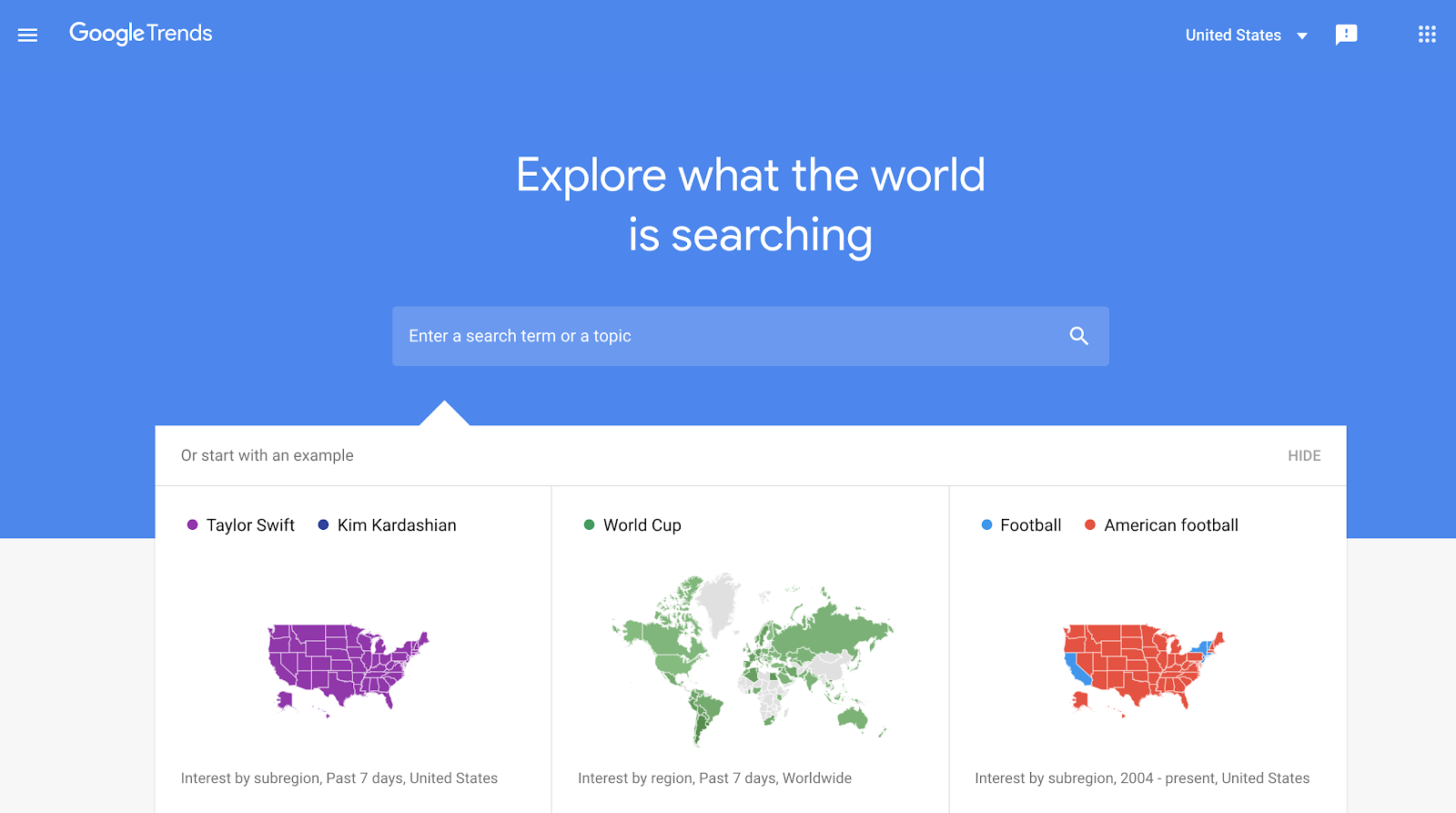
Google Trends tells you both when and where a particular keyword phrase is trending.
Here’s an example… I used Google Trends to do a hypothetical search. I chose the word “blogging” simply because I write frequently to answer questions like, what is a blog? and to give you an idea of how this tool works.
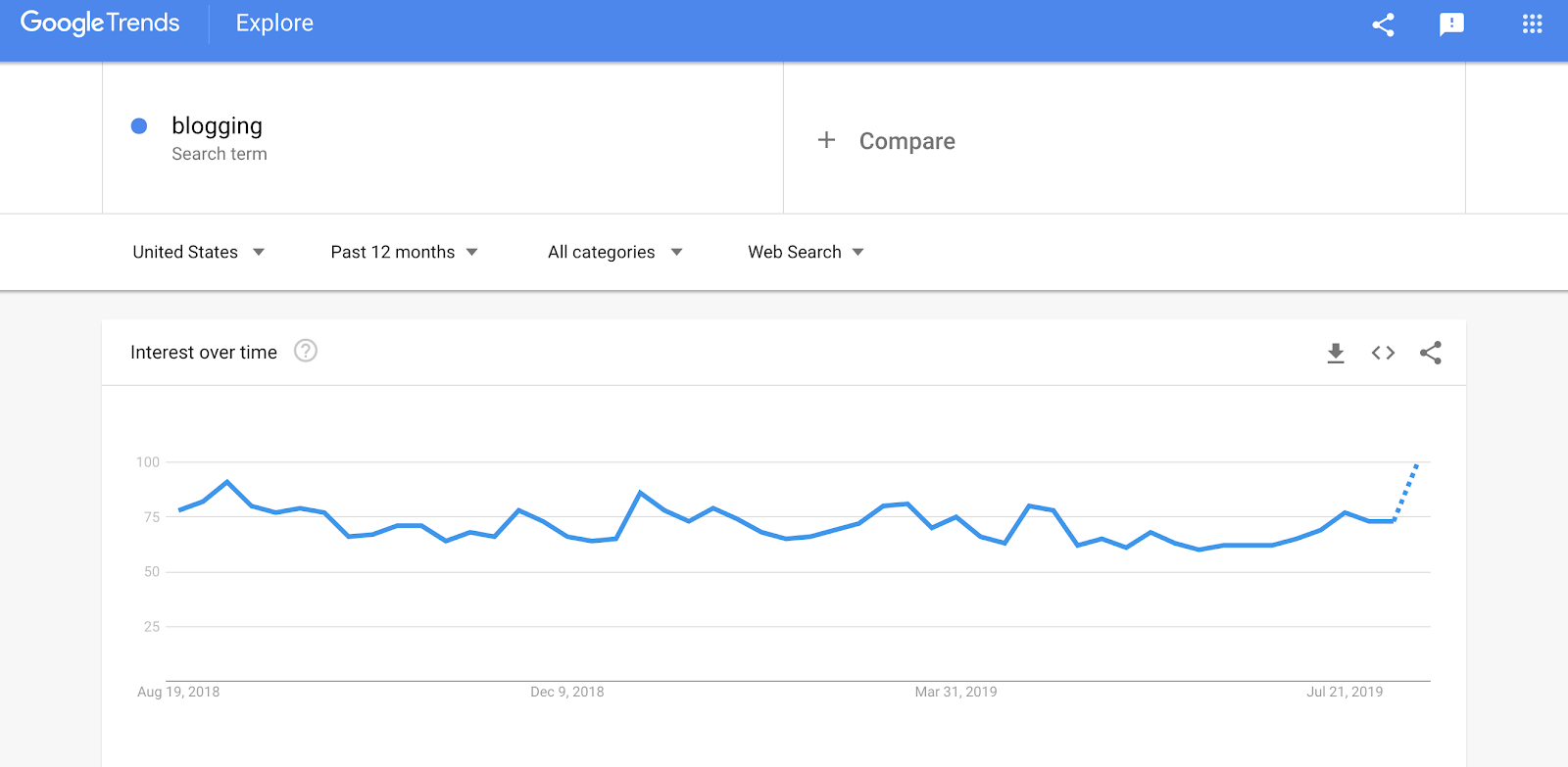
You can see that the term “blogging” has remained pretty steady on the graph for the last year.
And while there are of course peaks and valleys throughout the years, the term is pretty consistently high in search volume—with the dotted line at the end indicating Google’s prediction of a record surge in blogging related searches across their platform.
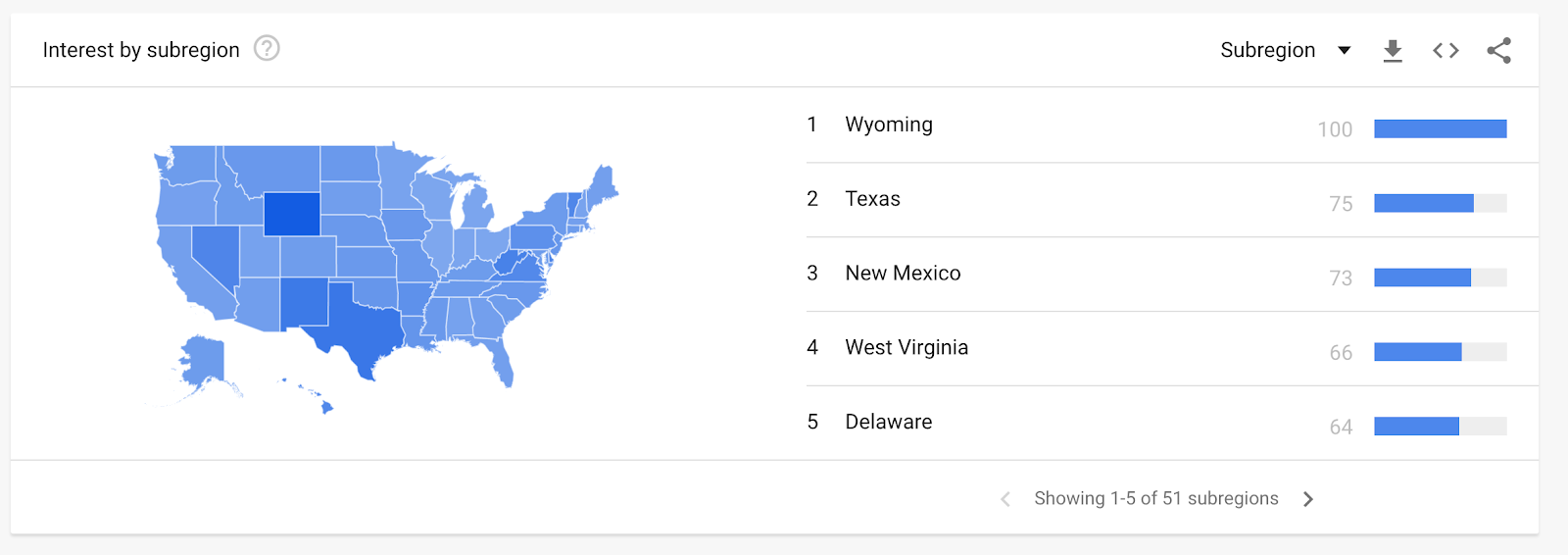
Google Trends also gives you awesome information like how popular your keywords are by region.
This can be broken down into cities, metros and even suburbs that have particularly high (or low) search volume to help inform on which geographic areas to focus your long-tail keyword research on.
It’s not limited to the United States, either. You can do the same keyword research for many other countries—or do the default search, which gives you results for the entire world as a whole.
Here are the same results for the popularity of “blogging” on Google Trends in South Africa:
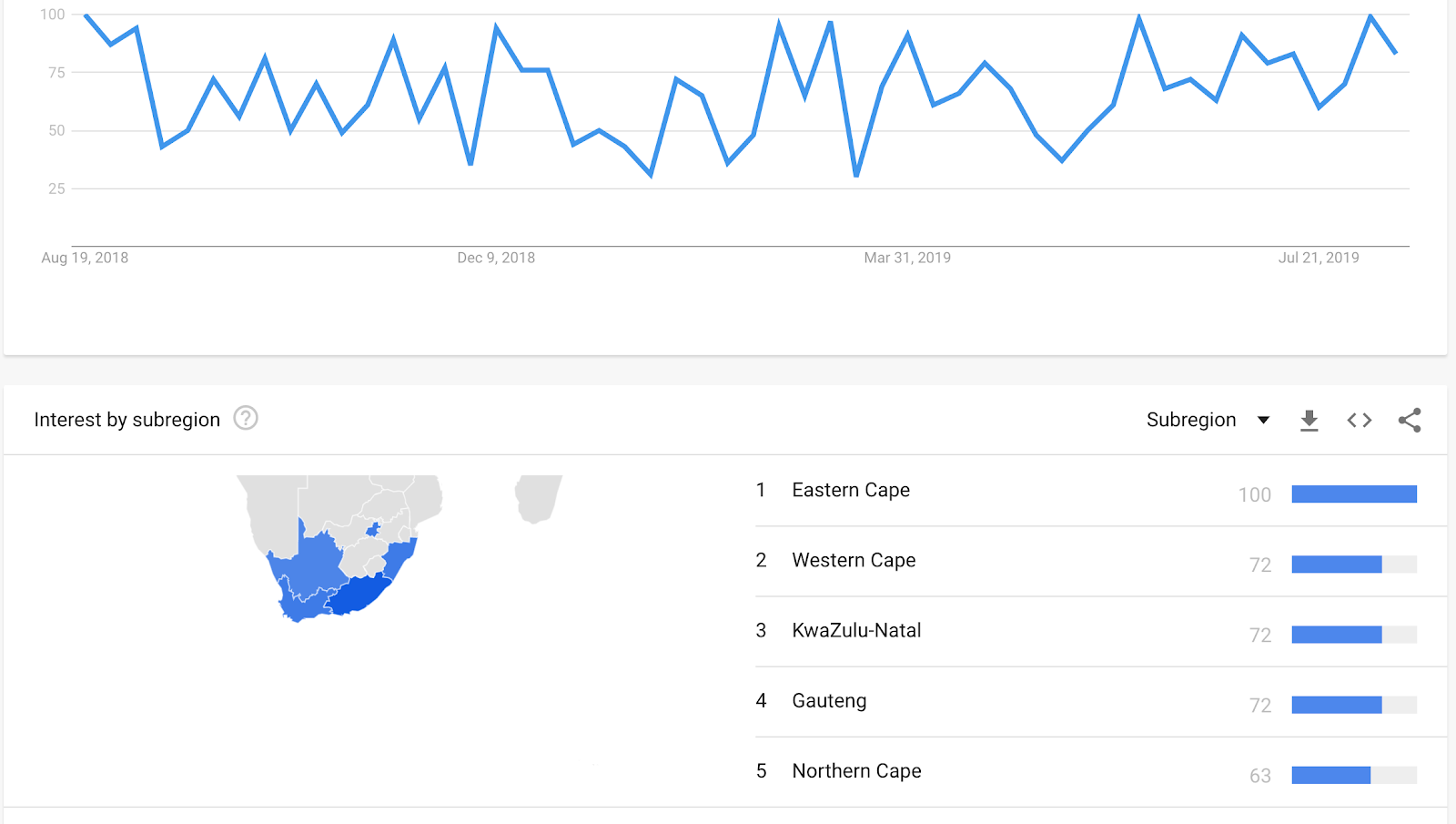
You can see that the term “blogging” has a lot more variability in South Africa, compared to it’s consistency throughout the year in the United States—but it still remains a very popular topic.
Another extremely under-appreciated insight Google Trends offers is related topics and related queries.
This is another (clever) way to do keyword research about the exact queries people are typing into Google, broken down by which related topics and queries are increasing most in popularity right now.
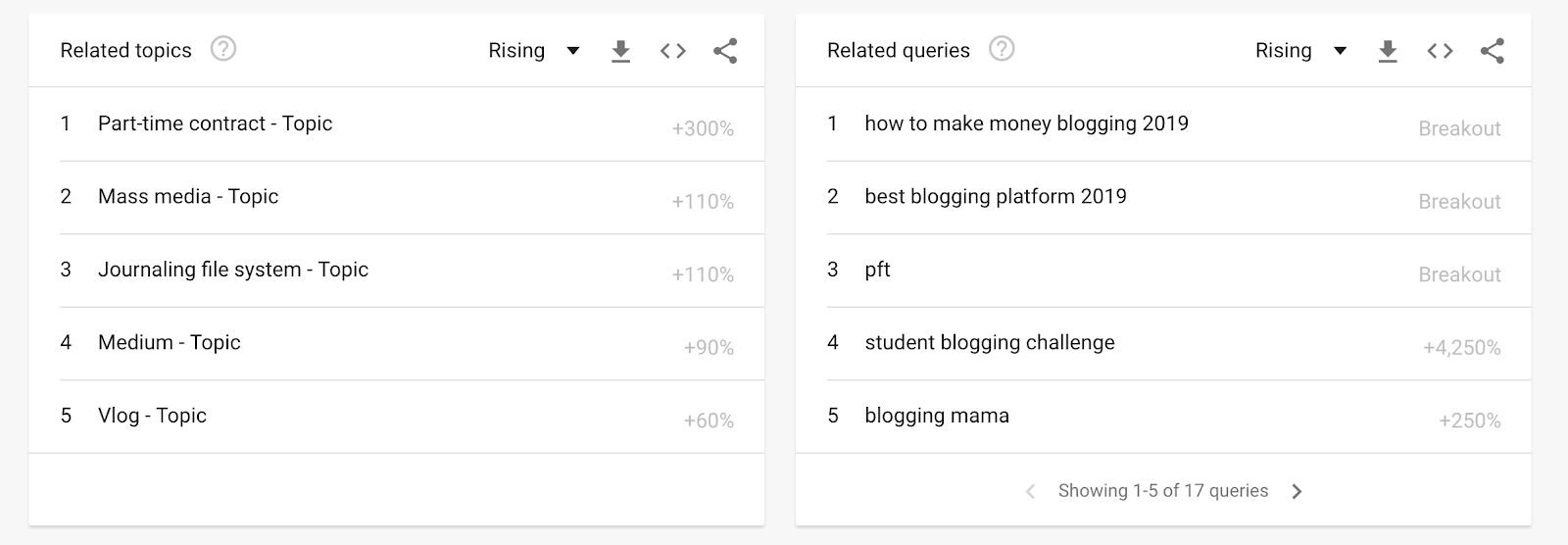
It’s seriously an incredible free keyword research resource.
And just for fun (to drive the point home) here, I chose the search phrase “Santa Clause” to see how it trends throughout the year.
Predictably, Santa Clause is really popular during the holiday season—followed by very few searches for just about the rest of the year. Most of which are probably kids using their parents phones to try and figure out whether or not Santa’s real… right?
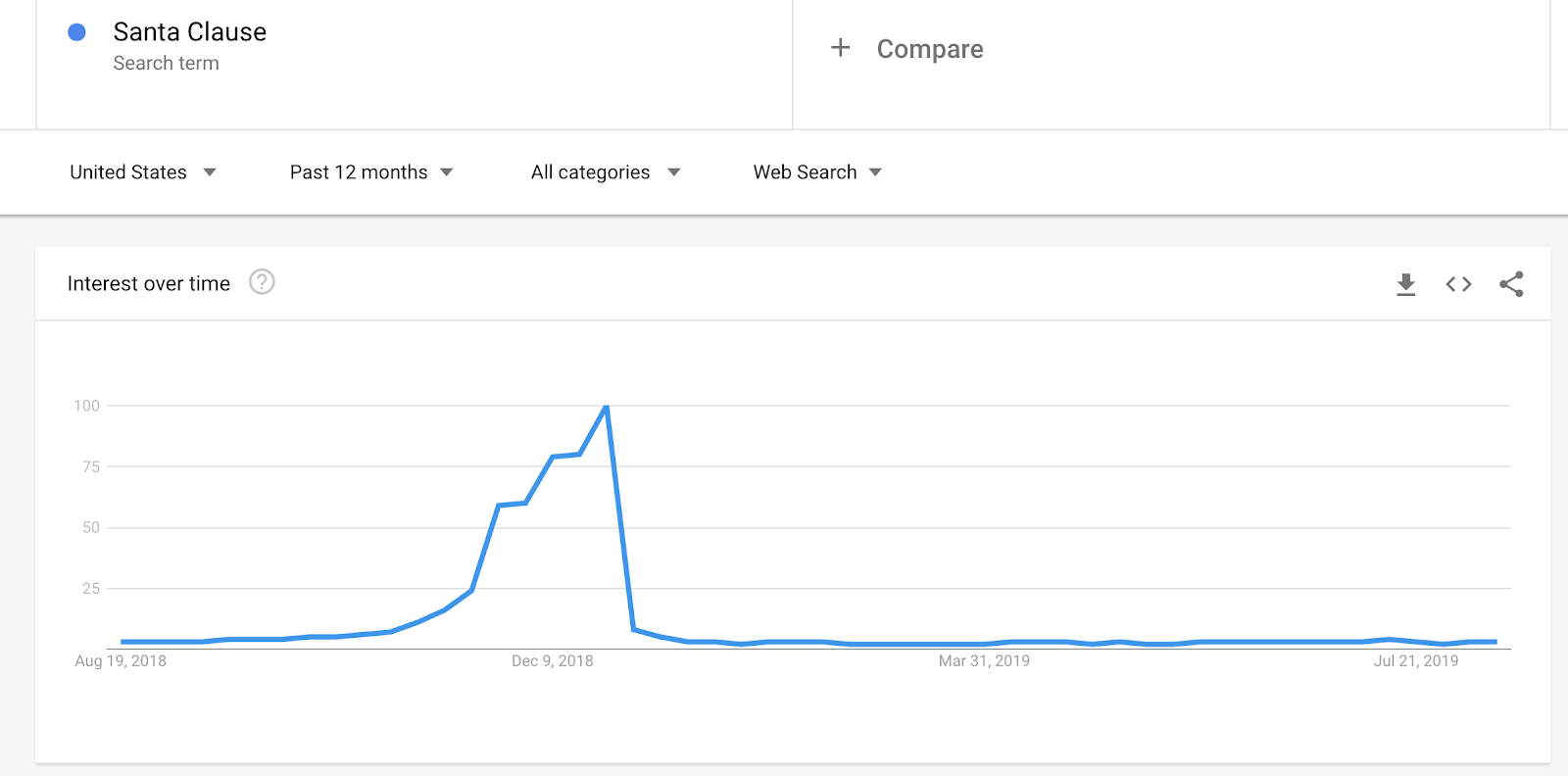
Alright, now we’re ready to move on and decipher how to match the search intent of your readers.
8. Understanding the Search Intent of Your Readers
If you’ve ever used Google, you know that you’re not always searching for the same thing (or for the same reason). Duh. Your questions and needs probably span a wide range of topics.
Sometimes you’re looking for basic details about a television show you’re interested in watching. Other times you may be ready to make a purchase of a new backpack or laptop and need some advice.
There are four major reasons that people use a search engine like Google—and knowing which of these reasons you’re satisfying for your visitors will help you do smarter keyword research, in order to attract only the visitors you’re hoping to bring in.

Here are the four major types of search-intent:
Informational Intent
The first kind (and highest level of) search that people conduct online is informational. This is a good category for most bloggers to try and satisfy with content, because we excel at offering information, advice and instructions to people looking for a little guidance within our respective industries.
Informational searches are usually done to find things like tutorials, tips, advice, solutions and other mechanisms that help the searcher to educate themselves on a particular topic.
For example, here are a few of my most popular guides that target informational intent:
- How To Start a Blog
- How to Make a Website
- What is WordPress?
- How to Name a Blog
- How to Make Money Online
- Best Business Ideas
Each of these articles strive to educate and inform my blog readers—so that they can go on to make a more fully informed decision about how best to move forward in their blogging journey.
Navigational Intent
The second kind of search intent is navigational. This kind of search is done by people who already know where they want to go or what they want to do—but use Google to help them get to that specific website.
Maybe they do this because they don’t remember the actual URL of the website, or because it’s easier to type it into Google and get a more accurate result.
Examples of navigational searches include things like:
- BestBuy
- B&H Photo
- WordPress login URL
Google’s very good at deciphering when a searcher is looking for a specific website. So, with navigational searches like this, there’s typically little opportunity for you to rank for any keyword phrases aside from those of your own web properties.
Nor should you want navigational traffic intended for other websites—because they’re trying to go elsewhere.
Transactional Intent
Transactional is the third kind of search intent. People doing this type of search are ready to buy something. Chances are high that they’ve already researched what they’re looking for, and are now ready to buy.
Transactional searches might include words or phrases like this:
- Best Monthly Hosting Plans
- MacBook Pro Sale
- Bluehost Pricing
- Shinola coupon code
- Built to Blog course
- Freelance content marketer
If you have a specific product or service you’re selling, then transactional keywords can be some of the highest value terms to do thoughtful keyword research around—and invest in a lot of search engine optimization to increase your rankings (and revenue).
Commercial Intent
Commercial searches are done by people who want a product or service, but haven’t picked a solution yet. They may be caught between multiple choices and searching for pros & cons—or they could be searching for something local for picking up the product nearby.
People in this search category might type in terms like:
- Best Web Hosting Plans
- Cheap Web Hosting Plans
- ConvertKit vs AWeber vs Mailchimp
- Pizza Place Near Me
- Best WordPress Hosting
- Tools for Bloggers
- Photography Store in My Area
- Best WordPress Plugins
These four categories do have some cross-over, but they’re a good starting point when you think about your blog.
If you’re not yet to monetize your blog, then targeting transactional or commercial searches probably won’t be your best investment of time. Neither will navigational searches, so focus on informational searches.
On the other hand, if you’re using your blog to make money—which I suggest doing—then you’ll want to go after at least some of the high purchase intent, transactional and commercial searches.
Even if you’re focused on an affiliate marketing revenue model where you’re not selling a product directly to consumers, these keyword phrases can be crucial to your business model. That way, you can educate and send them in the direction of a beneficial product or service you recommend.
9. Which Keywords Does Your Blog Already Rank For?
If your blog is already well-established, then you can use your Google Analytics dashboard to help understand which keyword phrases are bringing readers to your website. Another free keyword research source.
Check it out right here in your Google Analytics > Acquisition > Campaigns > Organic Keywords:
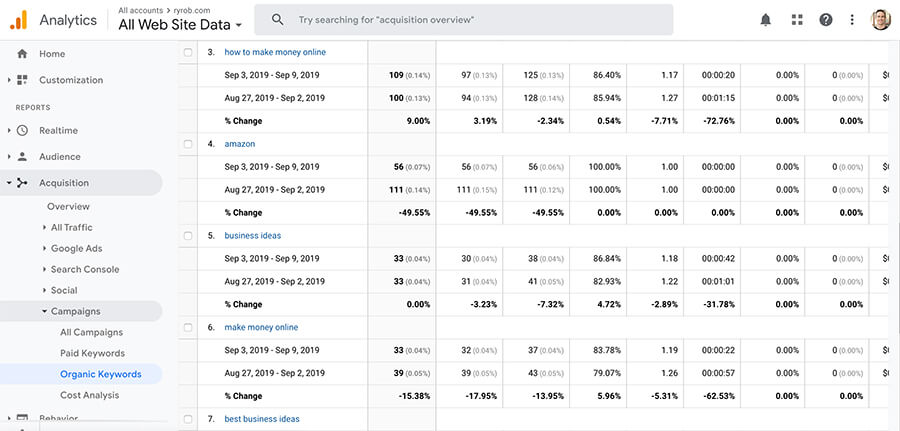
Another great (free) tool for doing keyword research on your existing traffic is Google Search Console.
To reach this report, navigate to Search Results > Open Report and you’ll see the queries that are getting both clicks and impressions on your blog:
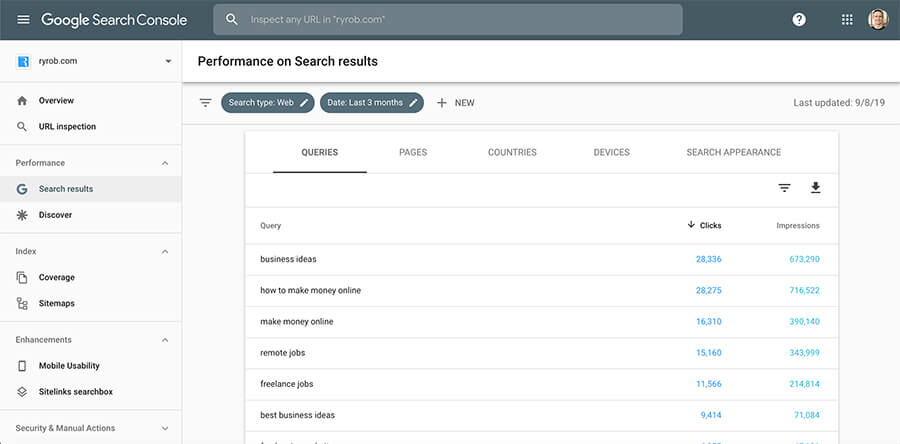
When you pull this report up, you’ll find a ton of useful keyword research information beyond just the terms you’re ranking for today.
You’ll learn what your average position is for each keyword, the number of impressions your article is getting and even how high your click rate is.
10. 8 Best Keyword Research Tools to Use (Free and Premium)
Alright, now that we’ve talked a lot about how to do keyword research, you’re pumped and ready to hit the ground running. But which tools are best for doing keyword research?
Here’s a list of some of the top free (and paid) keyword research tools on the market today.
Note: As many free keyword research tools rise in popularity, they often make an abrupt change over to being a paid tool. That’s why I built my own forever free keyword tool. As of this publishing, all of these keyword research tools here below are either free or offer a limited free trial so you can take it for a spin. If you Google search for “free keyword research tool” you’ll see the most recent and up-to-date tools 🙂
Now, let’s start with the free keyword research tools. This is a great way to dip your toes into the water—or keep running your blog on an aggressive budget.
1. Free Keyword Tool by Ryan Robinson

After a lot of hard work, I’m so proud to finally release my very own free AI-Powered Keyword Tool that’ll generate dozens of research-backed ideas for keywords & topics to write about on your blog today.
The core features we’ve built into my free keyword research tool include:
- Keyword suggestions for related keyword phrases you should consider blogging about
- Accurate estimates of monthly search volume (how many people search a topic on Google each month)
- Difficulty rating showing how challenging it’ll be to rank for a keyword (low, medium, high and very high)
- Idea generator that shows you dozens of topic ideas related to the keyword
- Suggestions on blog post titles & ideas on how to approach SEO-driven content for the keyword phrase
I’d love for you to try out my tool and let me know what you think in the comments below!
2. RightBlogger‘s Free Keyword Tool
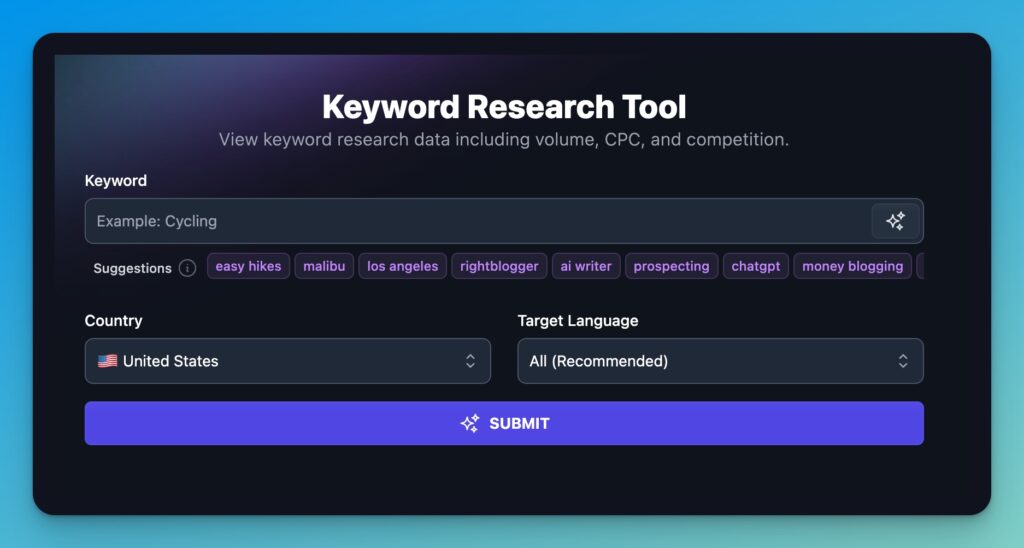
RightBlogger is my all-in-one suite of 65+ powerful tools for content creators, bloggers, and entrepreneurs to create great content, faster. Inside RightBlogger, we’ve got AI-powered content tools for improving your research, creation, optimization, and promotion.
Our free keyword research tool rules. Here are a few of my favorite features that make it stand out from the crowd:
- AI-Powered Keyword Suggestions: When you click the magic sparkle next to any keyword (or topic) you enter into the search bar, you’ll automagically get ~5 AI-powered suggestions for related keywords that’ll make your search more effective.
- Advanced Keyword Research: Our free keyword tool is designed to help you identify untapped opportunities and long-tail keyword phrases that’ll bring you more targeted traffic.
- 112+ Languages Supported: RightBlogger supports a wide range of languages for both our keyword research tool and across all of our AI-powered tools. The platform is only available in English, but head over to near the bottom of our homepage to see the full list of languages we support.
When it comes to keyword research, RightBlogger really excels. And while yes, I’m obviously biased, our tools are genuinely great. We wanna help you discover high traffic potential keywords, spot search trends, and optimize your content for maximum visibility.
Create SEO Blog Posts in Minutes with RightBlogger
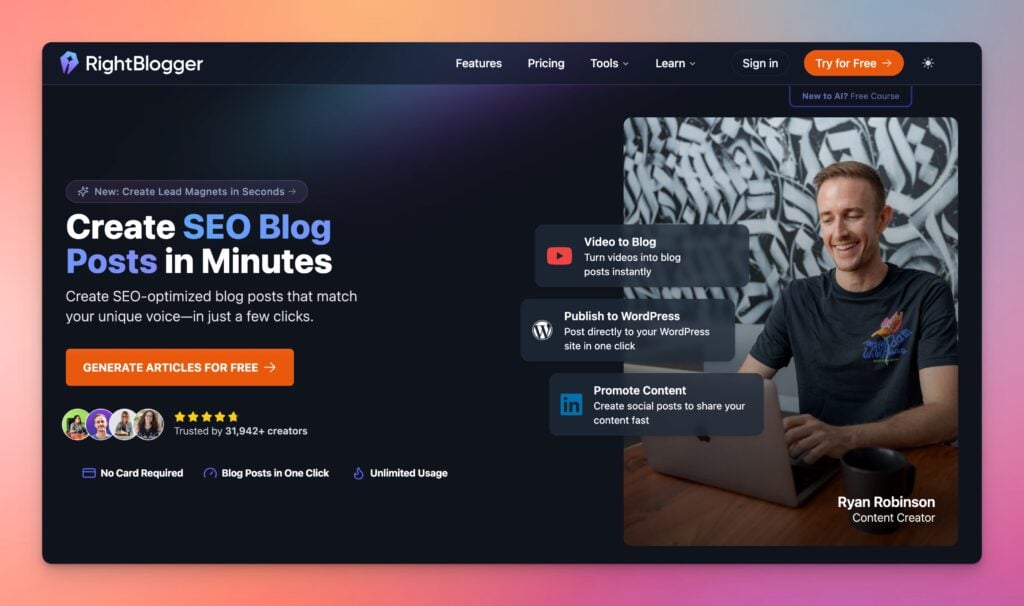
Join 31,942+ creators, bloggers, marketers, writers, freelancers & entrepreneurs in using my very own kit of powerful tools for content creation: RightBlogger. You’ll unlock 80+ blogging, SEO, marketing, sales and productivity-focused tools to create content faster & more effectively today. Plus, you’ll access our library of high-impact courses, a private community, and more.
3. Twinword Ideas
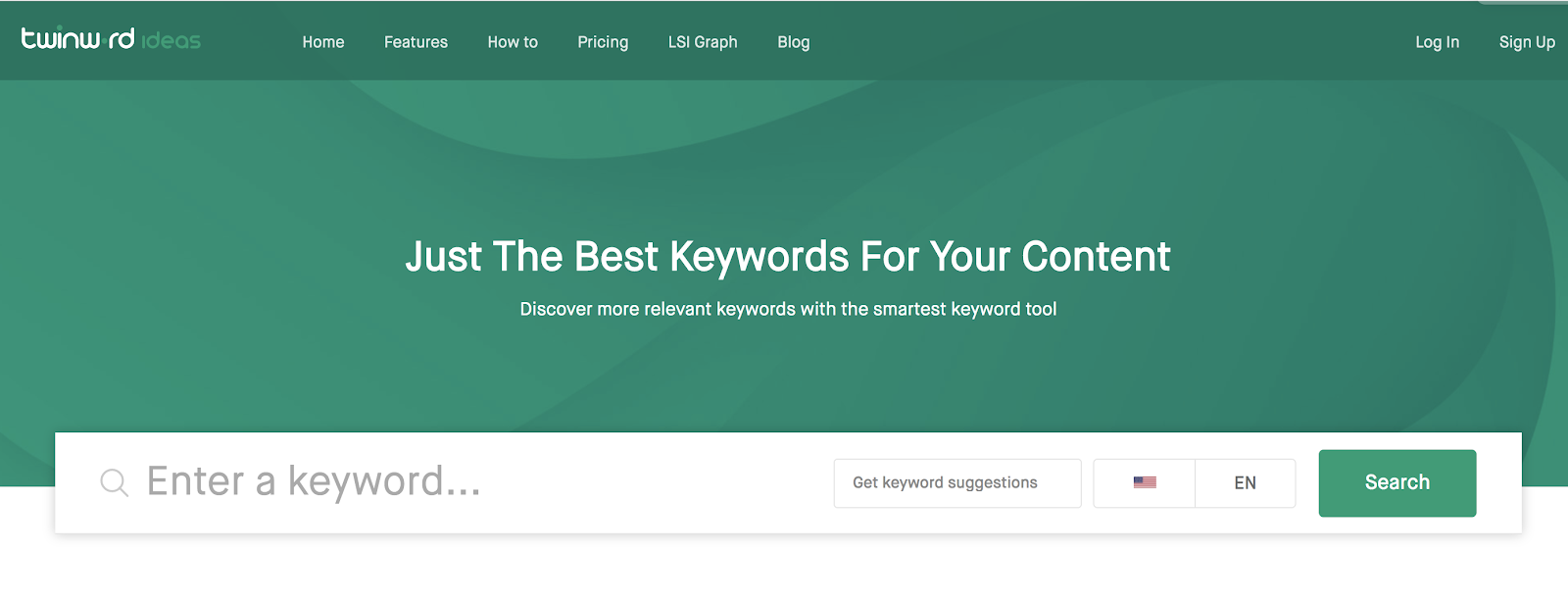
Right now, Twinword Ideas is my second pick for the best free keyword research on the market (behind my own, of course). They offer paid plans as well, but their free option has been one of the most comprehensive tools in this category.
Their features include:
- Relevant keywords
- Popular topics
- Keyword scores
- Suggested blog headlines to use
- Search volume
- Competition data
If you run the keyword “blogger” through their free platform, here’s the result page you’ll see:
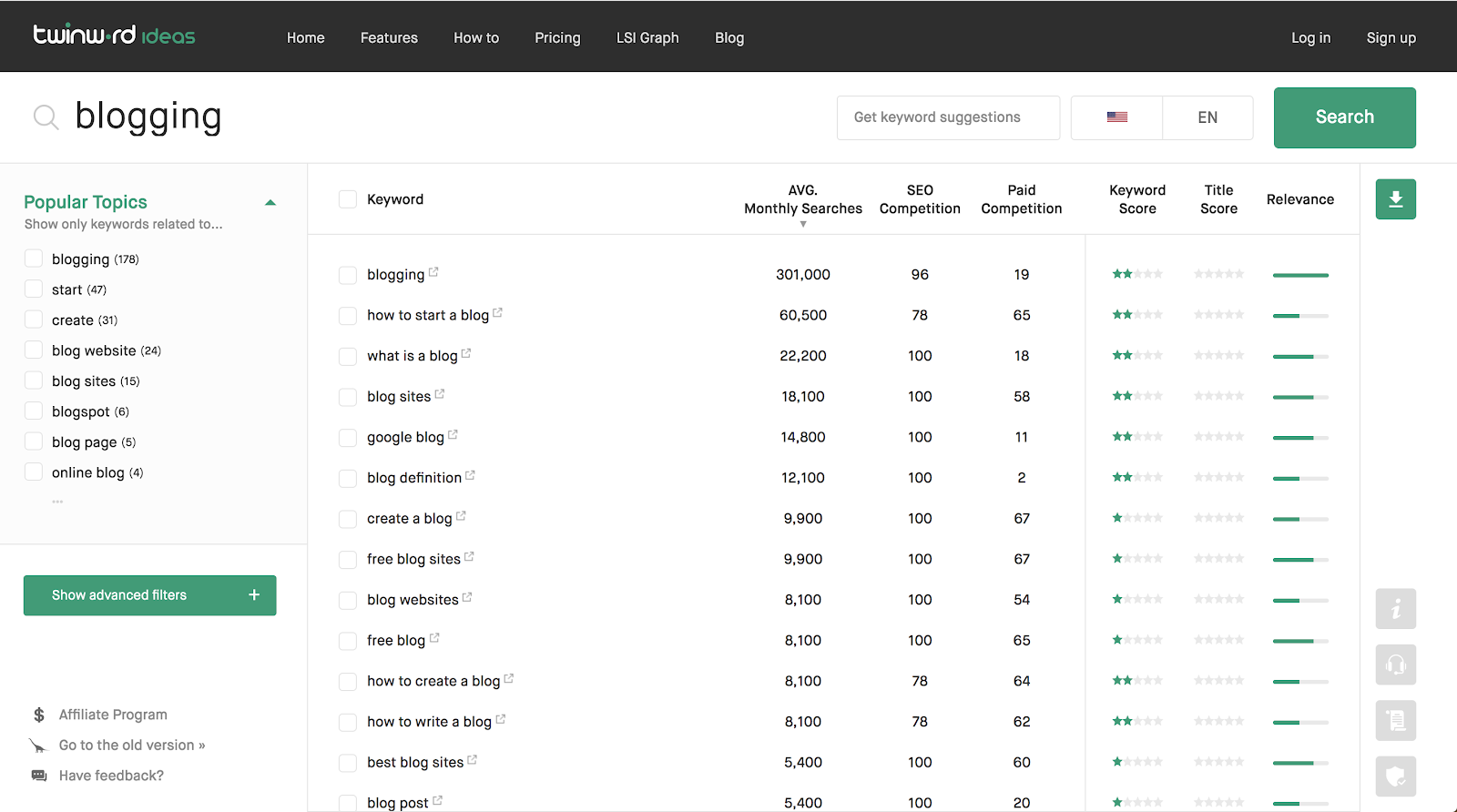
Now, onto our next free keyword research tool.
4. Keywords Everywhere (No Longer Free)

Another solid keyword research tool is Keywords Everywhere (which was free for a long time and recently switched to a paid model). That being said, their tool suite has been around the block for quite some time and they’ve added a lot of features & value to it in the past couple of years. Their tools offer these features:
- Monthly search volume
- Cost per click you’d pay if advertising for the term
- Adwords competition
- Competition data
- People also search for data
- Downloadable keyword metrics
Keywords Everywhere is a browser plugin for Chrome and Firefox, so it lets you find related keywords and phrases people are searching for directly from Google’s search engine results page.
5. Google Keyword Planner
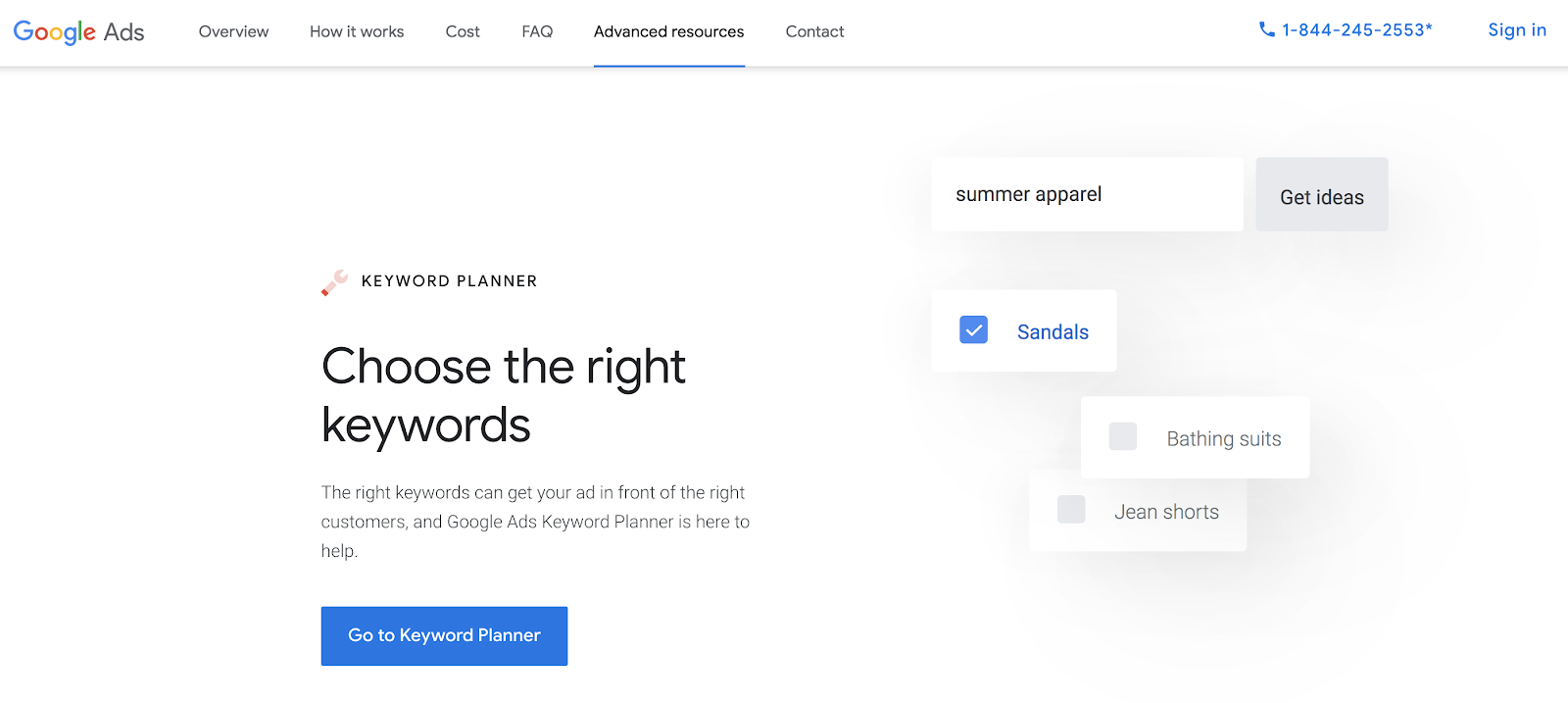
Google Keyword Planner is another good option because it’s free and gives you information pulled directly from Google’s own search data—but it comes with the caveat that you’ll need to create a Google Ads account first (in order to access this tool).
Google Keyword Planner offers features like:
- Keyword ideas
- Broaden your search
- Search volume
- Search forecasts
- Historical metrics
- Search domain or page (to find keywords) and more
Here’s an example of my Keyword Planner results from the term “blogging” when run through their system.
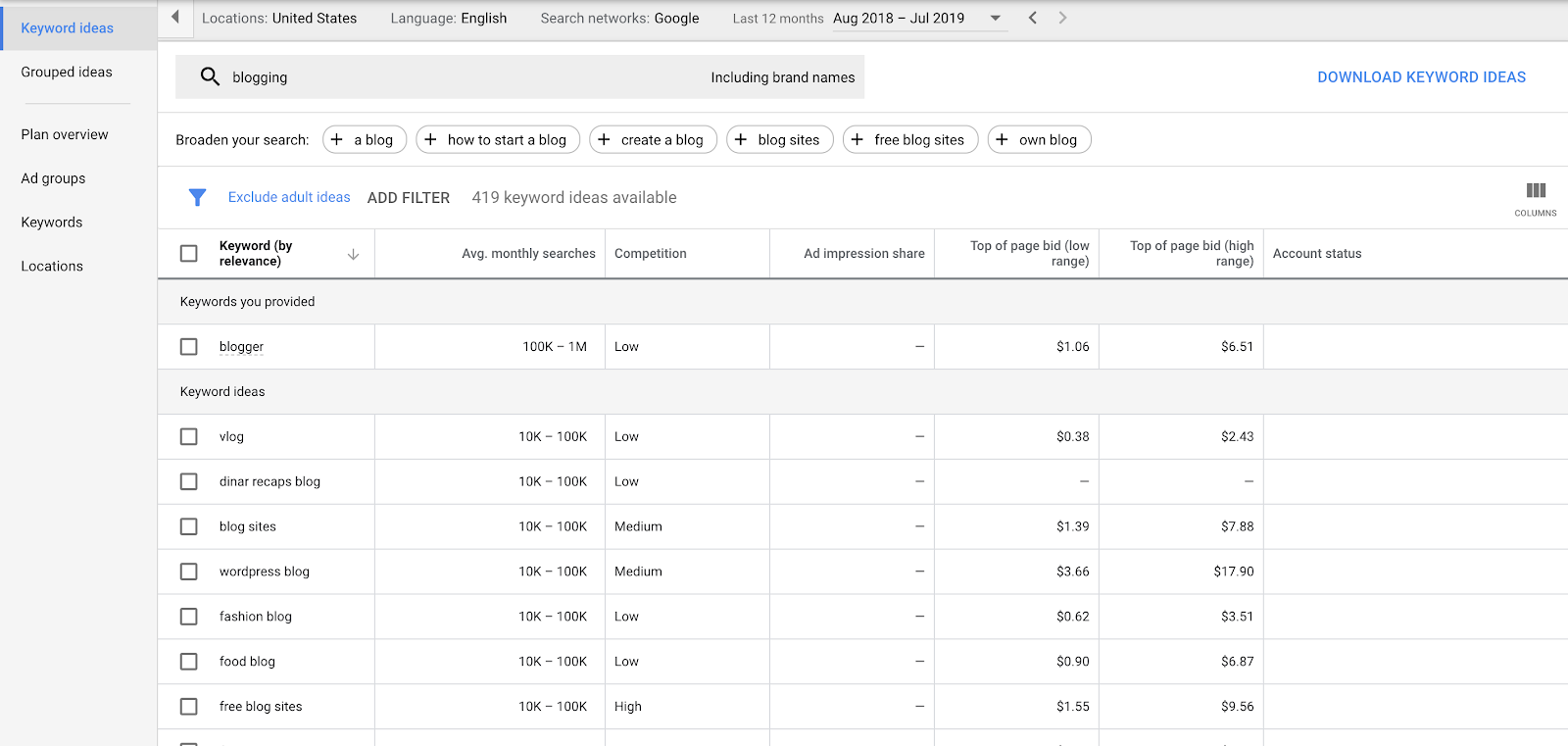
Now, let’s move into the paid keyword research tools.
Keep in mind that these paid tools offer a lot more than just the simple keyword data you can access using the free tools above—but if you’re not already pretty far along into your blogging journey yet, these might be a little beyond what you need today.
That being said, these more premium keyword research tools will help you completely rock your blog’s SEO efforts.
If you’re ready to increase your organic search traffic, here’s a list of the best paid keyword research tools available to help get you there.
6. Ahrefs
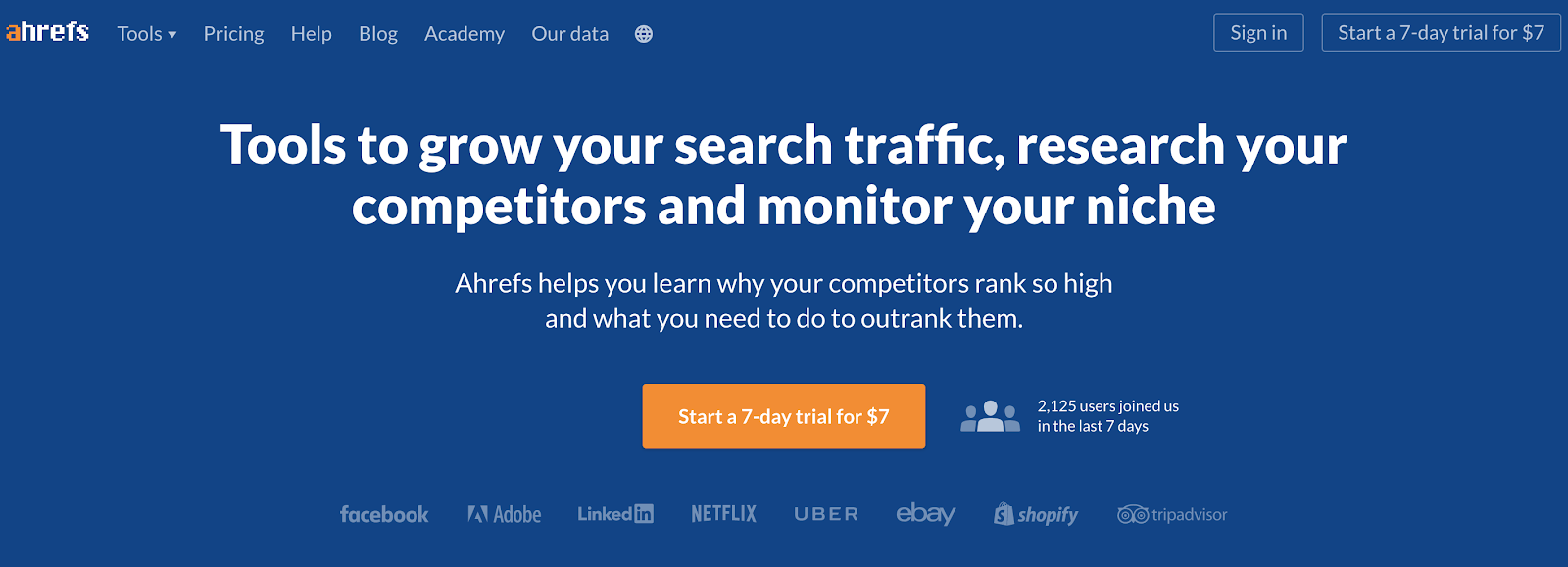
Ahrefs is hands down the most powerful comprehensive SEO tool for bloggers (not to mention that it shines when it comes to doing keyword research). Here are just some of the features Ahrefs offers:
- Backlink checker
- SERP checker
- YouTube keyword tool
- Amazon keyword tool
- Bing keyword tool
- Keyword generator
- Link checker
- Keyword rank checker
- Broken link checker
- Keyword difficulty
Here’s an example of how Ahrefs displays keyword research results in their Keywords explorer dashboard:
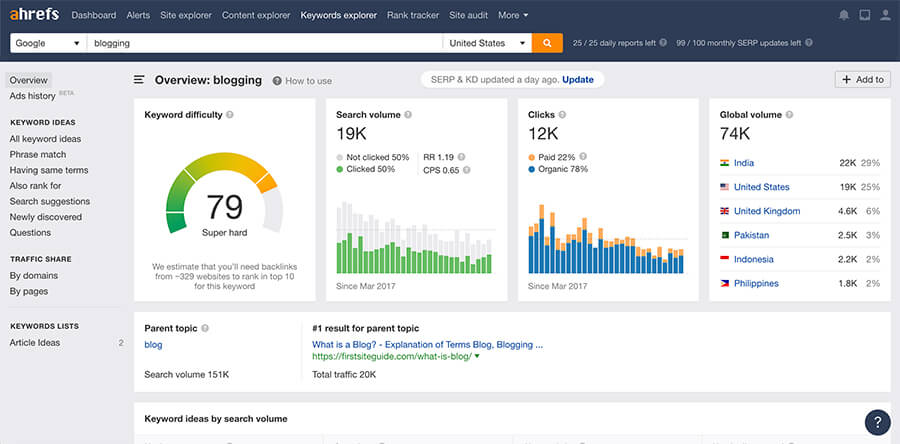
Ahrefs offers four pricing plans each, with higher levels of features and increased limits.
7. Moz

Moz is another very powerful, well-established SEO keyword research tool that offers a comprehensive range of features and is just as popular as Ahrefs:
- Site audits
- Rank tracking
- Backlink analysis
- Keyword research
- Create keyword lists
- Intuitive keyword suggestions
- Keyword metrics
- Custom reports
- Monthly search volume
- SERP features
- Organic CTR
- Difficulty score
They offer four different plans based on your keyword research needs.
8. SEMRush
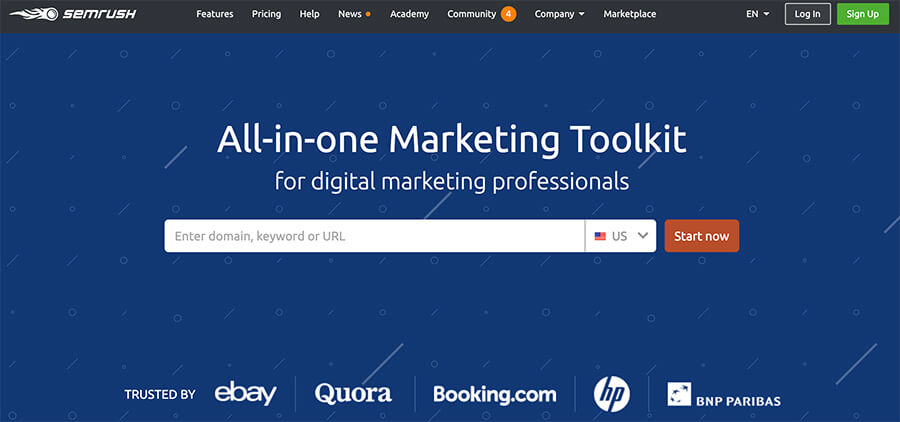
Having lately rebranded themselves as a more “all-in-one” marketing tool suite, SEMRush is the last paid keyword research tool I recommend checking out to evaluate for your needs. Their features include:
- Analytics reports
- Competitor best keywords
- Discover new organic competitors
- Keep track of domain positions
- Competitor analyzation for ad budgets and keywords
- Monitors ad copy and landing pages
- Localized ad campaigns
- Competitors’ GDN strategies
- Analyze competitors’ display ads
- View display ads from different devices
- Audience insights
- Deep link analysis
- Check backlink types
- Keywords for SEO and PPC campaigns
- Phrase matches and related keywords
- Long-tail keywords
- Keyword difficulty
- Find keywords with less competition
- Multinational and multilingual information
- Information about another company’s website traffic and online performance
SEMRush also offers four differently priced plans based on what your SEO needs are.
Final Thoughts: Using Keyword Research to Understand Your Audience and Craft Your Content
Keyword research is a great place to start when you’re looking to create standout content and drive more traffic to your blog—but it can’t be your stopping place.
Doing smart keyword research will tell you a lot about the general public, but you need to work hard and develop a strong understanding of who your target audience really is.
Who are you trying to attract to your blog, and what are they interested in? If you’ve picked a blog niche that you’re personally interested in, you probably have a good idea of the things your audience is searching for.
If you have a solid handle on your intended audience, your keyword research will gravitate towards the things that will get their attention. Now, let’s talk about using that keyword research to craft transformational blog content.
In my ultimate guide about how to write a blog post, I outline an extremely important concept in blogging. When it comes to creating content, you need to find something that you’re (1) personally interested in and (2) your audience wants to read about.
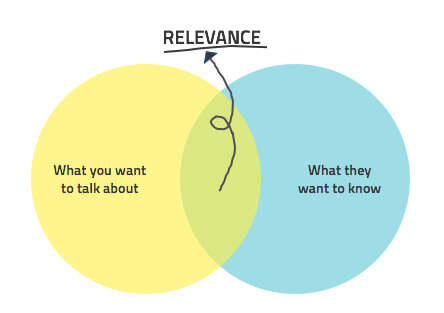
When you’re doing your keyword research, keep that important element in mind.
If you don’t want to write about a topic and the keywords won’t resonate with your audience, it really doesn’t matter how popular the terms may be. There are better options for ideas to write about on your blog—and you’ll learn a lot more about whether a topic is right for you during the process of writing a blog post outline to test the waters.
If I had to sum up my thoughts on keyword research it would be this:
Keyword research gives you a great foundation for understanding the content your blog needs to have.
In simple terms, keyword research shows you what people want to know. That’s a perfect place to start.
But your work doesn’t begin and end with keyword research.
Next comes the hard work of actually creating transformational content.
Don’t spend too much of your time searching for your keywords.
Find what feels like the right keywords for attracting your ideal audience today, and then create the best content you possibly can—for matching the search intent of that keyword phrase.
Your audience (or lack thereof) will soon tell you whether or not it was a smart keyword phrase to pursue.
Here’s my parting advice:
- Strive to go beyond surface information
- Find new ways of talking about common topics (like compiling this roundup of honest Bluehost reviews rather than simply crafting my own review to send out into the ether)
- Search for interesting ways to tackle your audience’s biggest problems
- Find creative topics that people want to read about but other blogs aren’t delivering
Your keyword research is only a stepping stone.
Once you know which keywords to write about—create content that truly helps people.
Use My Free Keyword Research Tool

Try my free AI-Powered Keyword Tool to get dozens of research-backed ideas for keywords & topics to write about on your blog today.

72 replies to “How to Do Keyword Research in 2025: Boost Your Blog Traffic”
Great information for beginner it is very helpful to start. Thank you.
Nice! You’re welcome, Thilanka 🙂
A easy to understand and implement blog, Ryan! Loved it and experience is full satisfaction.
🙏
Hey Ryan! Thanks for sharing this knowledge. I will use this idea for my blog.
You’re welcome! 🙂
Thanks Ryan, your articles have inspired me since I decided to really pursue this blog thing.
Glad to hear that, Lawal! Good luck with your new blog 🙂
Hi Ryan, this is great information fir beginning bloggers. Thanks for sharing!
Oops! Sorry about the typo! I wish there was an edit button.
You’re welcome, Tammy! 🙏
This is very helpful for beginner bloggers. Great!!!
Thanks, Maria!
Thanks, Ryan Robinson for sharing such a great piece of information about Keyword Research. Gained a lot of insight from it.
Keep Going!!
You’re very welcome, Lily 🙂
Hi Ryan.
I found a typo and thought you’d want to know. I would.
Thanks for all the great free advice. It’s so very helpful.
Best,
Dena
Right now, Twinword Ideas if my top pick
Would love a heads up about where the typo is, yes please! 🙂
Thanks, Dena
this was exactly what I was looking for
Ah, so happy to hear that, Alessa! Good luck with your blogging efforts—and be sure to try my free keyword research tool, it’ll be extremely helpful: https://www.ryrob.com/keyword-tool/
When it comes to SEO and blogging, keyword research goes a long way. Knowing which terms to write for not only helps with ranking but better understanding the content to focus on moving forward.
Absolutely! 🙏
Hi Ryan! Your keyword research tool is my number 1 choice to do my keyword research, so thanks for that?
Question: where can I learn about creating and incorporating tools in my blog?
Thanks for the kind words, Manuel! Glad you’re getting such great use out of it too 🙂
Now THAT is a good question. It’s been a very figure-it-out-while-we-go process of building these tools on my blog (with a friend of mine that’s a web developer by profession, as I couldn’t piece together something like that on my own). My guess is that there are some really good coding bootcamps and online course-style education resources on this topic. If I can come up with some good suggestions for you, I’ll pop back here with another comment.
Thanks man! This was very instructive
You’re welcome! 🙏
At its core, “keyword research” is a powerful market research tool that can be leveraged in many different ways, not just informing website content. To get the most out of keywords, you must look beyond the explicit, literal translation and also pick up on the implicit clues to gain the true intent of each keyword.
Great article! Thank you for posting this and sharing some tips and insights on how those tools can help us. Keep on posting!